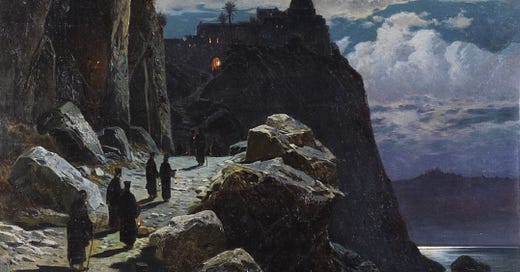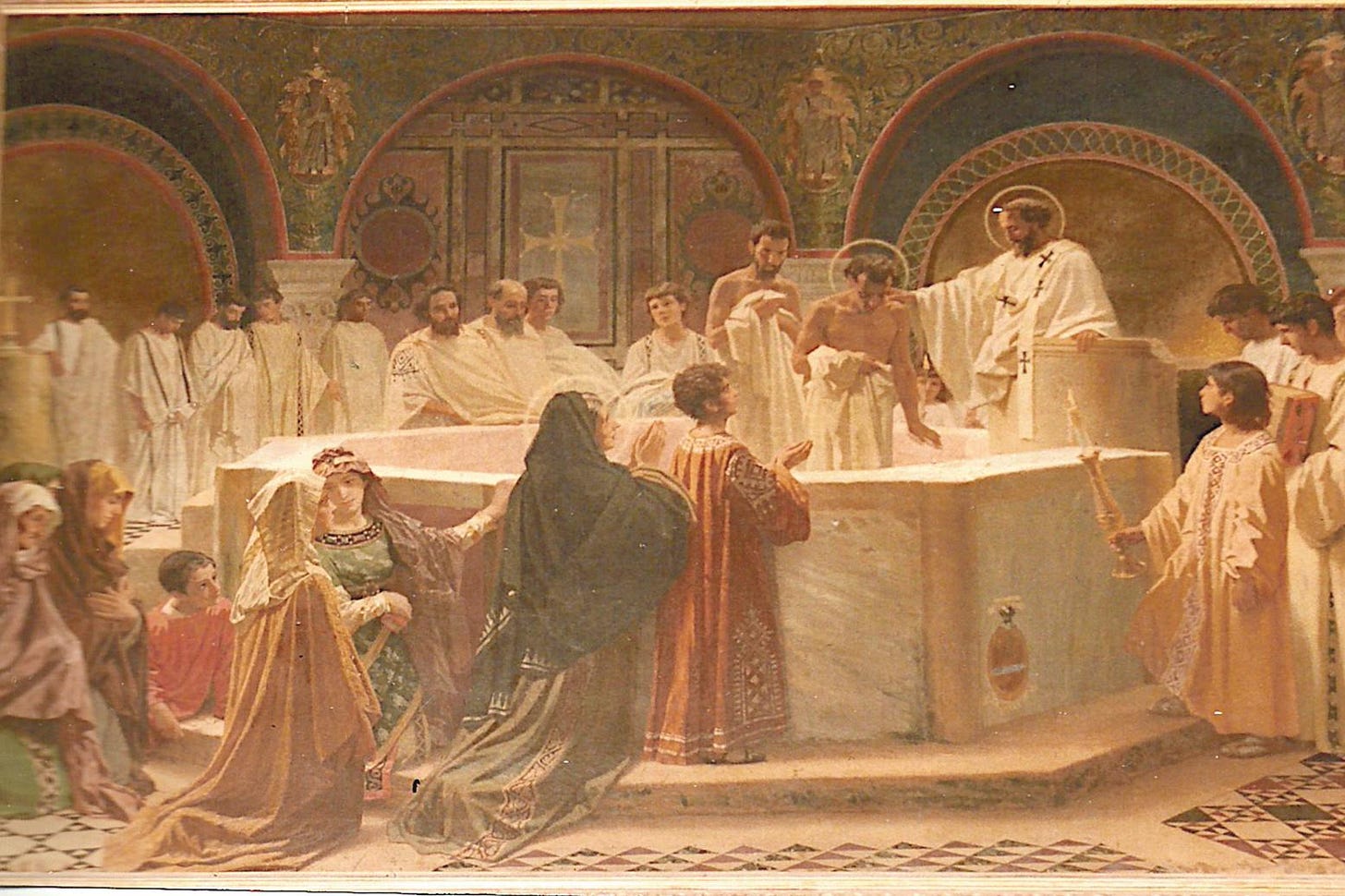Wake before dawn. Begin the walk, slowly because of your fast, to the doors of the church. Enter into the vestibule of the baptistry, joining the brothers there assembled. After the one who presides has read a Psalm and Gospel, and prayed according to his desire, make the Sign of the Cross.
Face the west. Face the direction of darkness, where the sun descends. Stretch out your hand, and say, “I renounce thee, Satan, and all thy pomp.” Then spit on the ground. Spit forcibly and resolutely, considering the reproaches of Christ better than all the treasures of Egypt, loving not your own life.
Then turn to the east: the direction of Light, the direction of the sunrise. The direction of our Lord’s return. The direction of the gate of Eden. Setting your mind now on Him who loved you and was crucified for your sins, who defeated death, and the one who had the power of death, you are to say, “I believe in Thee, Christ, my God, and I believe in Thy saving law. I believe and bow before Thee and all Thy servants, O Father, Son, and Holy Spirit.”
Now you will be baptized. There will be rejoicing among the hosts of heaven, and wailing among the demons, as the Crucified takes one of their captives captive.
Greetings, brother true! Welcome, one who once was a child of wrath, but now will eat at the table with the sons of God! The bishop’s kiss of peace, the right hand of fellowship, and the riches of Christ await you. Come, and feast, without money and without price.
Enmity with the Serpent
This week I have been reading Josef A. Jungman’s 1959 book The Early Liturgy. I was struck by a detail in the chapter on the Baptismal rites of the early church.
In the Canones Hippolyti, an Egyptian adaptation of the Apostolic Tradition [by Hippolytus], the rite has the following form: The baptizand should first turn toward the west…and should address the devil: ‘I renounce thee, Satan, [and all thy pomp].’ After that he should turn towards the east…and should cry out: ‘I believe and bow before Thee and all Thy servants, O Father, Son, and Holy Spirit.’ —The Early Liturgy1
Added to those instructions, there is a note about another custom in vogue in the third century:
After the baptizand had faced westward and pronounced his renunciation of Satan, he was instructed to expectorate forcibly before turning eastward towards Christ; in other words, he was to spit on Satan. This was simply a robust symbol of hostility, a token of the irreconcilable enmity which from then on must exist between himself and the powers of evil. —The Early Liturgy2
I like how spiritually grave this custom is. There is a strength, a manhood, a war-like and sober attitude that is fitting for the armies of saints and martyrs. This forcible renunciation of the devil, amplified with spitting3, stands out. Baptism is not a frivolous or quaint ceremony. It is spiritual war.
Pompa Diaboli
One of the prominent features is the renunciation of Satan “and all his pomp.” Jungman writes:
Pompa was, in the culture of antiquity, a festive procession, a marching around at some god’s feast, at which idols were carried along. The devil is, as it were, constantly conducting such a triumphal procession in the world… But in Baptism the candidate drops out of this procession, he leaves the devil's camp, and enters into the camp of Christ’s army. —The Early Liturgy4
This imagery of a festive procession is vivid. In antiquity, there was the Colosseum, the theaters, the “bread-and-circuses”, the mystery cults, drunkenness, and all sorts of sexual immorality in this procession. In our day, we have the same things, but amplified with better speakers and seen in crisp 4K.
We have exited the parade of the devil. We daily have to renounce him, as well as his festive march. We plug our ears to the siren song. His festive march is the “course of this world”.5 It is the march to hell. Numquam suade mihi vana.
For those in Christ, their baptism is a past reminder of this central renuncio, credo. And as we received Christ Jesus the Lord, as we have put on Christ, so now we walk in Him.6 We belong to Christ. We overcome the devil by the blood of the Lamb. We renounce the darkness if we stumble into it. We renounce the occasion of sin when it is presented to us. This renuncio is often what makes up the reproach of the Christian life:
With respect to this they are surprised when you do not join them in the same flood of debauchery, and they malign you; but they will give account to him who is ready to judge the living and the dead. —1 Peter 4:4
The man who renounces appears impotent to the man incapable of renouncing.
I Renounce, I Believe
Our faith has always been a denial as well as a confession. There has been enmity with the serpent since the garden. Just as entering into eternal life is normally preceded by death, so in Baptism, there is first a renunciation of even our own life. We hear Jesus is Lord on the lips of millions of martyrs, who know firsthand how incompatible that short creed is with the powers of darkness.
A collection of isolated beliefs is an unassuming, harmless thing. It is the sort of thing that the Interfaith organizations at universities like to promote. There is always room in the secular Pantheon for another niche for another idol. There is always room to join that procession in the wide and easy path to destruction.
But the baptized have another procession: the train of His robe filled the temple.8 We have joined the triumphal procession of Christ: a procession that goes from glory to glory, that is the aroma of Christ to the world, that goes to the place He has prepared for those who love Him. May our renunciation of the devil and our confession of Christ be on our lips till the end.
But thanks be to God, who in Christ always leads us in triumphal procession, and through us spreads the fragrance of the knowledge of him everywhere. —2 Corinthians 2:14
So let us turn to Christ: the Sun of Righteousness, and the bright Morning Star, begotten of His Father before all worlds, Light from Light, Very God of Very God. The light shines in the darkness, and no darkness can overcome it.
Josef A. Jungman S.J., The Early Liturgy, pg. 82
Ibid. pg. 83
Remember Jude 1:6, that even the angels often simply say, “the Lord rebuke you.” It is only in Christ that we are in authority over the powers of darkness, not in our own strength. This is not meant to be a frivolous and jesting spitting.
The Early Liturgy, pg. 80
Ephesians 2:2
Colossians 2:6
Isaiah 6:1






I’m Orthodox. We still spit =D
This article is amazing. Thank you a lot.